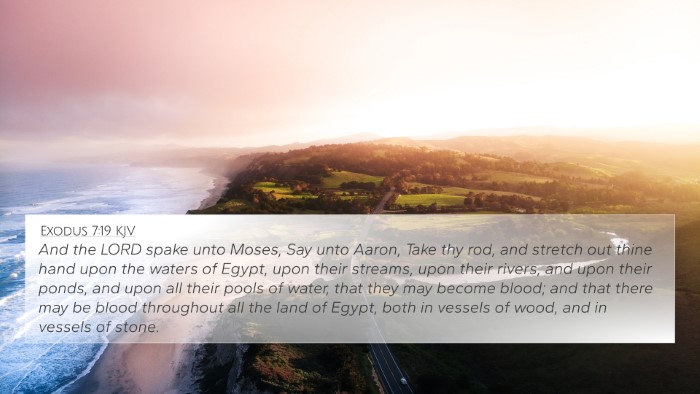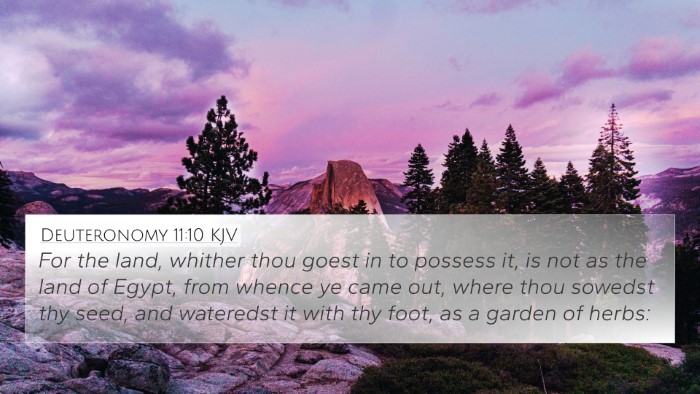Understanding Isaiah 19:10
Isaiah 19:10 speaks to the condition of Egypt, describing how the foundations of its economy and society will be crushed. The verse reads:
"And they shall be broken in their work; all that they make shall be torn in pieces, and all that they make shall be in vain."
This prophetic declaration reflects God's judgment against the people who have turned away from Him. The commentary insights below provide a comprehensive understanding of this verse through cross-referencing and thematic connections with other scriptures.
Key Insights from Public Domain Commentaries
- Matthew Henry's Commentary:
The loss of the Egyptians' labor reflects God's sovereignty over nations. Henry explains that their crafts and works, without divine blessing, are rendered ineffective. This highlights the futility of human endeavors apart from God.
- Albert Barnes' Notes:
Barnes emphasizes the idea that divine retribution will impact not only individuals but entire nations. The destruction of their works serves as a direct consequence of their idolatry and disobedience.
- Adam Clarke's Commentary:
Clarke notes that the inward corruption of Egyptian society is likened to physical ruin, as their economic base collapses. His interpretation suggests that moral decay leads to tangible consequences, a frequent theme throughout scripture.
Bible Verse Cross-References
To fully grasp the implications of Isaiah 19:10, consider the following related Bible verses:
- Jeremiah 51:58: Discusses the downfall of Babylon and the destruction of her labor, drawing parallels to the message in Isaiah about divine judgment.
- Ecclesiastes 2:11: Reflects on the futility of earthly toil without divine purpose, reinforcing the theme of vanity in labor.
- Haggai 1:6: Highlights the frustration of laboring without blessing, offering a direct linkage to the consequences faced by Egypt.
- Isaiah 40:23: Emphasizes God's control over the rulers of the earth, linking back to the ultimate loss of power and stability in ungodly nations.
- Psalm 33:10-11: Illustrates how the plans of nations (like Egypt) are rendered void by God, affirming the futility of human efforts without divine approval.
- Luke 12:20: Shares the parable of the rich fool, underscoring the theme that wealth and labor can ultimately be in vain if not aligned with God's will.
- Proverbs 10:22: Stresses that the blessings of the Lord make rich, contrasting with the shattered efforts described in Isaiah.
Thematic Connections between Bible Verses
The themes of futility, divine judgment, and the consequences of moral failure run throughout the Scriptures. These thematic connections allow for deeper insights into Isaiah 19:10:
- Futility of Work Without God: Threads through Ecclesiastes and Jeremiah, illustrating the repeated message that human effort devoid of God leads to ruin.
- Divine Sovereignty: Seen in Jeremiah and Isaiah, it underscores how God governs the rise and fall of nations based on their faithfulness or rebellion against Him.
- Moral Decay and Its Consequences: Reflected in both prophetic literature and the wisdom literature, emphasizing that societal corruption results in tangible consequences.
Inter-Biblical Dialogue
Isaiah 19:10 is not only a statement of judgment but opens up a dialogue with other parts of the Bible through parallel teachings and impending fulfillment. The cross-references cited show a web of connections that enrich our understanding of God’s justice and the fate of nations:
Understanding Isaiah 19:10 through these connections allows for a richer analysis of the scriptures. Engaging with comparative Bible verse analysis and inter-Biblical dialogues enhances our interpretation and application of Biblical truths in today's context.
Using Tools for Bible Cross-Referencing
To effectively study verses like Isaiah 19:10, tools for Bible cross-referencing such as concordances and cross-reference guides prove invaluable. Methods like thematic Bible verse connections and cross-referencing can deepen one’s understanding. Whether you are preparing a sermon or simply seeking personal spiritual growth, knowing how to find cross-references in the Bible greatly enriches your study.
Conclusion
In summary, the prophetic message of Isaiah 19:10 serves as a stark reminder of the consequences of turning away from God. Through cross-referencing with other scriptures, we gain insights into the nature of divine judgment and the importance of aligning our works with God’s will. By understanding these connections, we can appreciate the depth of scripture and its relevance in guiding our lives today.





